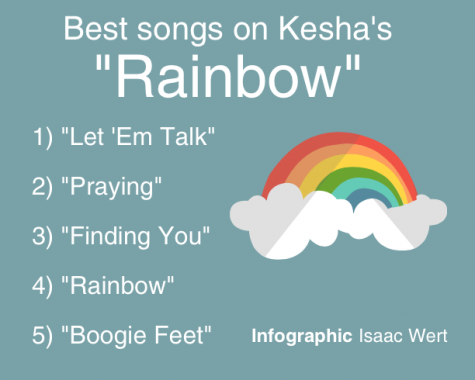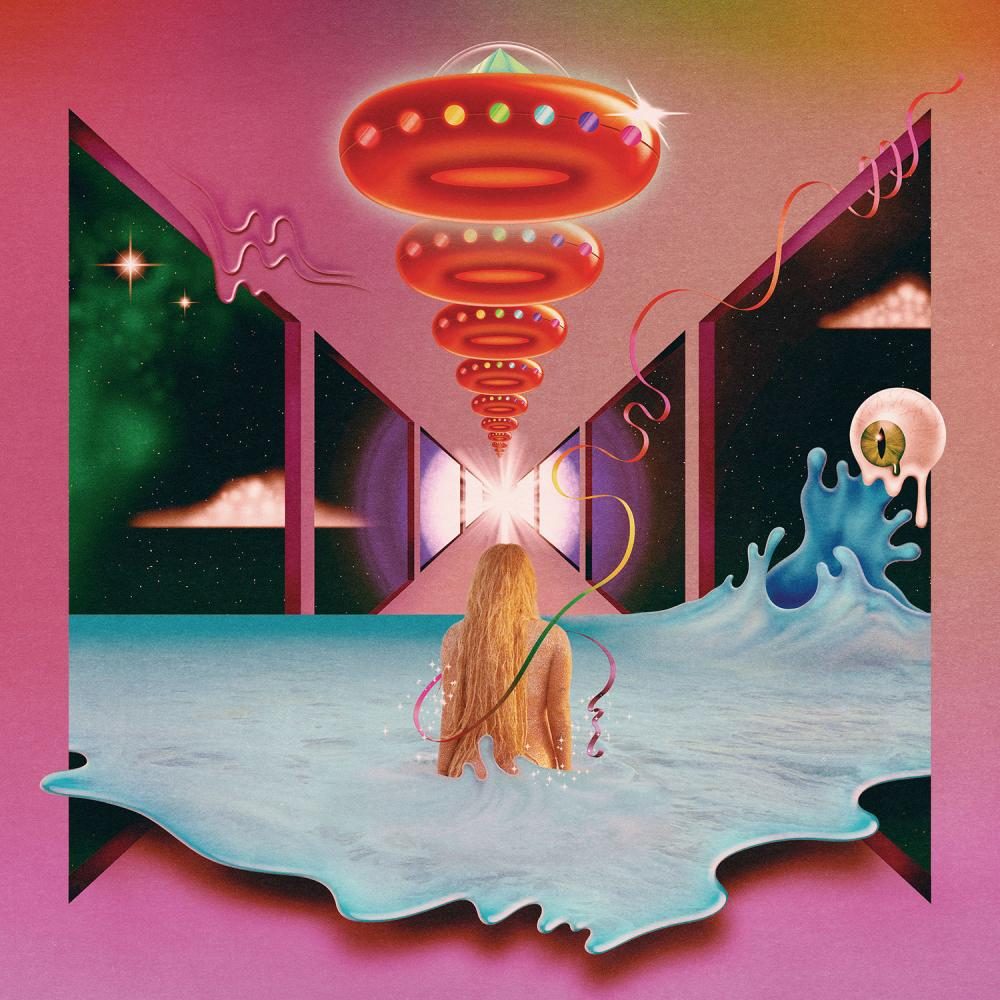‘Rainbow’ illuminates Kesha’s once-suppressed evolution
Sebert’s comeback album kills her contrived party-girl-ego
Following a five-year hiatus from releasing music, and while dealing with ongoing legal battles, former party-girl icon Kesha released her triumphant third album, “Rainbow,” and we’re lucky to hear it.
Kesha Rose Sebert, formerly known as “Ke$ha,” was once an international pop-star. Her breakout hit, “Tik Tok,” topped the Hot 100 for nine weeks and indisputably changed the course of mainstream music at the time. Sebert’s sound heavily relied on synthesizers and auto-tune, and her brand centered around drinking and partying.
Combining Sebert’s songwriting with teams of Swedish producers, including her long-time collaborator Lukasz Gottwald, known as “Dr. Luke,” Ke$ha became a vehicle for hit songs over the following years. But throughout the duration of her international reign, Sebert was having less fun than her party-girl-ego conveyed. Sebert was battling anorexia and bulimia, which she attributes to industry pressures, and ultimately spent time in rehab.
Sebert’s highly-publicized legal battles began following allegations that her longtime producer “Dr. Luke” sexually and emotionally abused her. Multiple court battles ensued, and for five years, Sebert was legally unable to release an album without working with Gottwald, which she refused to do. This gridlock continued until a groundbreaking shift this past May, in which Sony cut its ties with Gottwald, essentially allowing Sebert to release music on her own terms.
Free of her alleged-rapist and her infamous dollar sign, “Kesha” crafted an album that shines light on the breadth of her artistry. “Rainbow” explores various genres and showcases Sebert’s songwriting skills, her underrated vocals, and her unstoppable spirit.
The album’s stunning title track, which Sebert wrote entirely by herself during her time in rehab, and the album’s lead-single “Praying,” co-written by Ryan Lewis, are both glorious statements of her outlook on the trauma she’s faced and stand out among her discography as her best ballads. Both tracks are indescribably beautiful, and worth a listen, even just to hear Sebert’s perspective on her highly-publicized struggles.
However, despite the challenges she’s faced, “Rainbow” isn’t a dark album. It’s about exactly what its title suggests: the light after the storm. “Rainbow” is a fun and wild record, even without the techno production and careless-drunk attitude found in Sebert’s previous work. “Rainbow” maintains its pop genre while recalling rock and country influences.
As a singer-songwriter, Sebert had an active role in writing the album. Many songs on the album are also co-written by Sebert’s mother, Pebe Sebert, best known for writing country classic “Old Flames (Can’t Hold a Candle to You),” which (Kesha) Sebert covers on the album.“Rainbow” also features writing credits from Ricky Reed, Stephen Wrabel and Justin Tranter.

While Sebert’s voice is the pillar of “Rainbow,” the album does feel scatterbrained in some respects. Juggling multiple teams of unrelated producers, the album bounces around and covers many genres. When listening to some of its varied highlights – rock anthem “Let ‘Em Talk,” poppy “Learn to Let Go” or folky “Finding You” – it’s clear the album lacks a unifying sound. However, what “Rainbow” lacks in genre/mood consistency, it makes up for in consistent quality. It’s difficult to single-out objectively bad tracks on “Rainbow,” as it’s variety ensures that every listener can find something they like.
This past year, many female artists have chased a trend of “authenticity,” stripping back the production of their music and taking an (ironically common) “alternative” approach to their respective genres. Notable examples include Lady Gaga, Miley Cyrus and Selena Gomez. With “Rainbow,” Sebert is following a similar trend, but given the adversity she’s faced, Sebert’s artistic evolution carries a much greater weight.
Sebert has long been an underestimated force in the music industry, and understandably so. Stifled by her producers, the shackles of auto-tune and generic party lyrics, Sebert has long seemed to be another disposable pop star.
Regardless of your potential preconceptions about her, Kesha’s “Rainbow” is definitely worth a listen, providing a glimpse at Sebert’s personal evolution, her musical talents and her exciting potential moving forth independently.
“Rainbow” is currently available on iTunes for purchase and on Spotify for streaming.
“Rainbow”: 4/5

Hi! I'm Isaac J. Wert, your local entertainment editor. I love music, television, art and pop culture, and especially love reviewing them.



